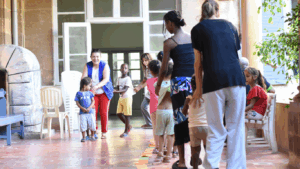
It is very clear to see that our world is in turmoil. From civil war in Sudan to the invasion of Ukraine – we are witnessing atrocities often placing communities already incredibly vulnerable into greater despair.
Worldwide conflict has doubled over the past five years (ACLED, 2024) with countries like Palestine, Syria, Lebanon and Myanmar being the most dangerous with extreme levels of conflict.
81% of Palestine’s population is exposed to conflict and with over 30,000 fatalities in the past 12 months alone – civilians remain under daily assault from bombings and attacks. In Syria, prolonged years of war has left communities helpless and in Lebanon, bombings and displacement has spread leaving families in need of food aid.
We are living in times where war crimes and injustice are documented live on our smartphones and in the headlines with global solidarity dimming in devastating foreign aid cuts (Guardian, 2025)– it is understandable to feel numb sometimes and hopeless.
But there is always hope.
Speaking to our friends at Canadian Jesuits International (CJI) in the beginning of month, Dan Corrou, SJ, Director of Jesuit Refugee Service Middle East and North Africa (JRS MENA) underscored the need to support efforts that respond to the plight of refugees and migrants, noting that while the number of displaced people worldwide is rising, funding is diminishing.
USAid cuts and other foreign aid budgets are withholding help and assistance that NGOs like us and JRS rely on to continue to support communities caught in the crossfire as global conflict creates rampant displacement.
“Those people that are displaced aren’t displaced by choice… There is a tremendous need, and they are very vulnerable, whoever they are, however they arrive,” Dan said.

The Arrupe Migrant Centre in Lebanon. Gives families a safe space during crisis & is focal point for aid distribution.
Speaking of the generosity of supporters, including Ireland, Dan conveyed the immense gratitude for the Xavier Network’s* support in refugee projects which are lifelines for refugee families trying to piece their lives back together.
“We have relied on you in times of war, in times of the earthquake in Syria, in times of the explosion in Beirut port, on multiple occasions in emergencies,” said Fr Dan.
“But also, in the day-to-day, in our normal operations. We’re very grateful for that continued solidarity, that continued commitment. It is tremendous help to know that we have friends here.”
“This support has helped JRS pursue its commitment to the most vulnerable—regardless of religion, ethnicity, or background” he continued, “We welcome the most vulnerable as sister, brother, companion on their journey. That is our job.”
Since 2008, JRS has supported marginalised communities in Lebanon, Syria, Jordan, and Iraq—providing support from humanitarian aid and shelter to psychosocial support and education services to forcibly displaced persons.
JRS’s presence is especially vital in countries like Lebanon, with a population of over 5 million, which now hosts 1.5 million Syrian refugees. There, JRS operates schools and community centres.
When the conflict between Hezbollah and Israel escalated last fall, these facilities were transformed into emergency shelters and safe havens for migrants, Syrian refugees, and vulnerable Lebanese.
“As the war happened, we had to stop all our traditional operations… Our schools became more like shelters,” Dan explained.
At the heart of our work and partnership with JRS is accompaniment.
“Accompaniment is to be with, to be radically in solidarity with our sisters and brothers… whoever we are, whatever religion we are, whatever our background is, wherever we come from, that we are worth God’s dwelling with, and therefore worth being with as sisters and brothers.”
Dan recounted how during the crisis, people of all faiths turned to JRS for help. “They showed up to the church because they knew that that was the place where you go when things go bad… that’s where their friends [were]… it was overwhelming.”
“These relationships are rooted in the quiet, faithful presence of the Jesuits in Lebanon and Syria since 1656”, he said. “When someone had died and the body had been left to rot in the morgue, Jesuits [in the church] would show up and give them a burial with dignity… this was the place where you go when things are really bad.”
Our Food appeal is about continuing this legacy of hope and accompaniment to vulnerable communities.
For #RefugeeWeek you can do something amazing and donate to give food aid to displaced families struggling with hunger.
You can find out more about the appeal and our partnership with JRS: here
*The Xavier Network of which IJI and CJI are members, consists of 14 mission offices and non-governmental development organizations of Jesuit provinces across Australia, Europe, and North America.
You can read Dan’s talk in full by visiting our friends at CJI: here
Photo credit: JRS MENA.


